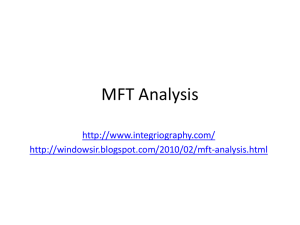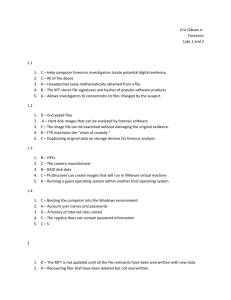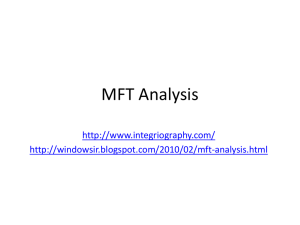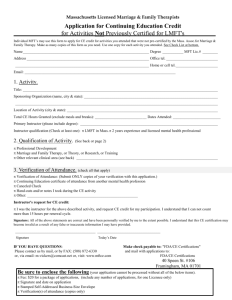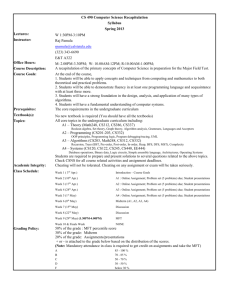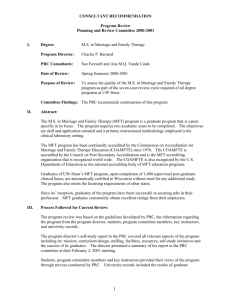Marriage & Family Therapy Assessment Tests List
advertisement
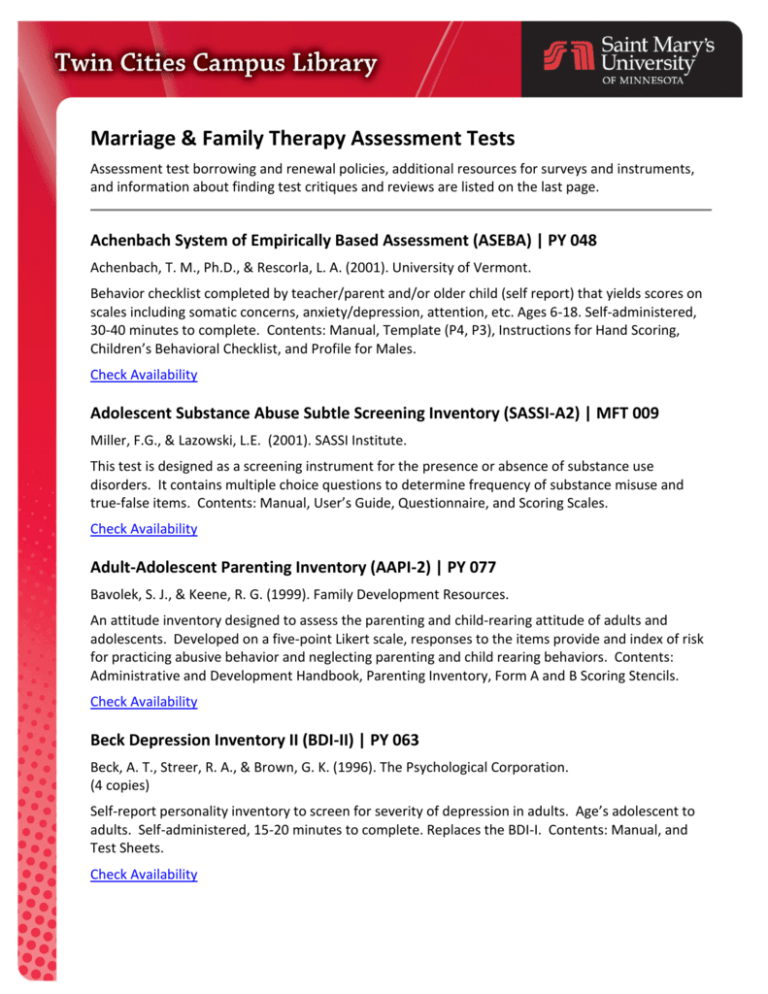
Marriage & Family Therapy Assessment Tests Assessment test borrowing and renewal policies, additional resources for surveys and instruments, and information about finding test critiques and reviews are listed on the last page. Achenbach System of Empirically Based Assessment (ASEBA) | PY 048 Achenbach, T. M., Ph.D., & Rescorla, L. A. (2001). University of Vermont. Behavior checklist completed by teacher/parent and/or older child (self report) that yields scores on scales including somatic concerns, anxiety/depression, attention, etc. Ages 6-18. Self-administered, 30-40 minutes to complete. Contents: Manual, Template (P4, P3), Instructions for Hand Scoring, Children’s Behavioral Checklist, and Profile for Males. Check Availability Adolescent Substance Abuse Subtle Screening Inventory (SASSI-A2) | MFT 009 Miller, F.G., & Lazowski, L.E. (2001). SASSI Institute. This test is designed as a screening instrument for the presence or absence of substance use disorders. It contains multiple choice questions to determine frequency of substance misuse and true-false items. Contents: Manual, User’s Guide, Questionnaire, and Scoring Scales. Check Availability Adult-Adolescent Parenting Inventory (AAPI-2) | PY 077 Bavolek, S. J., & Keene, R. G. (1999). Family Development Resources. An attitude inventory designed to assess the parenting and child-rearing attitude of adults and adolescents. Developed on a five-point Likert scale, responses to the items provide and index of risk for practicing abusive behavior and neglecting parenting and child rearing behaviors. Contents: Administrative and Development Handbook, Parenting Inventory, Form A and B Scoring Stencils. Check Availability Beck Depression Inventory II (BDI-II) | PY 063 Beck, A. T., Streer, R. A., & Brown, G. K. (1996). The Psychological Corporation. (4 copies) Self-report personality inventory to screen for severity of depression in adults. Age’s adolescent to adults. Self-administered, 15-20 minutes to complete. Replaces the BDI-I. Contents: Manual, and Test Sheets. Check Availability Children’s Depression Inventory (CDI) | PY 073 Kovacs, M. (2003). MHS. (5 copies total, 2 copies restricted to MFT students) The CDI measures the extent and severity of depressive symptoms in children aged 7 to 17. Contents: Manual, CDI form, Short Version, Teacher Version, and Parent Version. Check Availability Clinical Rating Scale (CRS) | MFT 004 Olson, D. H. (2000). Life Innovations, Inc. The Clinical Rating Scale is for the Circumplex Model of marital and family systems. The Circumplex Model is made up of three primary dimensions: family cohesion, family flexibility, and family communication. The assessment is performed by a therapist who interviews families and uses the Circumplex Model to evaluate answers. Contents: Manual, four journal articles, and guide to "Family in Films" video. Check Availability Conners’ Rating Scales-Revised (CRS-R) | PY 008 Conners, C.K., Ph.D. (1990). Multi-Health Systems. (2 copies) Behavior checklist completed by parent and/or teacher that have 5-7 factors useful for screening for behavior problems. This checklist is best known for its ability to identify children with Attention Deficit Disorder. Ages 3-17. 15-20 minutes to complete. Contents: Technical Manual, Parent Rating Scale – Revised (S), and Teacher Rating Scale – Revised (S). Check Availability Conflict Tactics Scales Handbook | MFT 011 Straus, Murray A., & Warren, W. Louise (2003). WPS. (2 copies) The Conflict Tactics Scales (CTS) have been used to evaluate violence within families and intimate relationships, containing the Revised Conflict Tactics Scales (CTS2) and CTS: Parent-Child Version (CTSPC). Contents: Manual and autoscore forms. Check Availability Dyadic Adjustment Scale (DAS) | MFT 003 Spanier, G. B. MHS. (13 copies) 32-item instrument to be completed by one or both partners in a relationship. Designed to measure the quality of a relationship. Norms are presented separately for married and divorced couples. The DAS can be completed in 5-10 minutes. Contents: Manual and Profile Form. Check Availability Eating Disorder Inventory—3 (EDI-3) | MFT 007 Garner, D. M. (2004). PAR. (2 copies, 1 copy restricted to PY students) The Eating Disorder Inventory-3 (EDI-3) is a revision of the most widely used self-report measure of psychological traits or constructs shown to be clinically relevant in individuals with eating disorders. Contents: Professional Manual, Item Booklet, Answer Sheet, Profile Form, and Directions. Check Availability Evaluating and Treating Families: The McMaster Approach | MFT 017 Ryan, Christine, et al. (2005). Routledge (2 copies) "[T]he McMaster approach to family therapy is noted for the solid theoretical base that underlies the model and the comprehensive and collaborative therapeutic process between the therapist and family members. ... The McMaster approach provides a solid framework for eliciting information from families, obtaining accurate assessment to determine diagnoses, and for setting up a workable treatment plan."--Introduction, p. xi and xiii. Check Availability Family Assessment Device (FAS) | MFT 005 Epstein, N. B., Baldwin, L. M., & Bishop, D. S. (1983). Brown University/Butler Hospital Family Research Program. A sixty-item questionnaire used to assess family functioning. It is designed to be used as screening device to allow therapists or researchers to identify problems in and a simple and efficient way. Contents: Manual and articles. Also called McMaster Family Assessment Device. Check Availability Family Assessment Measure Version III (FAM-III) | PY 023 Skinner, H. A., Ph.D., Steinhauer, D., & Santa-Barbara, J. (1995). Multi-Health Systems. (2 copies) Self-report instrument that provides quantitative indices of family strengths and weaknesses. Basic concepts assessed include task accomplishment, role performance, communication, affective expression, involvement, control, and values and norms. Takes about 30-40 minutes to administer. Contents: Technical Manual, ColorPlot of Family Perceptions, General Scale, Self-Rating Scale, and Dyadic Relationship Scale. Check Availability Family Environment (FES) | MFT 001 Moos, R. H., & Moos, B. S. (1994). Consulting Psychologists Press, Inc. (2 copies) “The FES is composed of 10 subscales that measure the actual, preferred, and expected social environment of families. These 10 FES subscales assess three underlying sets of dimensions: relationship dimensions, personal growth (or goal orientation) dimensions, and system maintenance dimensions.” Contents: Manual, Form I, Form R, Form R Interpretive Report Form, Social Climate Scale Profile, Family Environment Scale, and scoring stencil. Check Availability Gilliam Asperger’s Disorder Scale (GADS) | PY 102 Gilliam, James E. (2001) PRO-ED, Inc. The GADS helps evaluate children with unique behavioral problems who may have Asperger's Disorder and differentiate from those who have autism or other related pervasive development disabilities. Check Availability Gilliam Austism Rating Scale, 3rd Edition (GARS-3) | PY 103 Gilliam, James E. (2014) Pro-Ed. The GADS helps evaluate children with unique behavioral problems who may have Asperger's Disorder and differentiate from those who have autism or other related pervasive developmental disabilities. Check Availability Marital Satisfaction Inventory, Revised (MSI-R) | MFT 002 Snyder, D. K. (1997). WPS. (6 copies) “The MSI-R is a self-report measure that identifies separately for each partner in a relationship, the nature and extent of distress along several key dimensions of their responses of ‘True’ or ‘False’ to each of the 150 MSI-R inventory items.” Contents: Manual, Use Intro Disk, AutoScore Form, and Profile Form. Check Availability Marriage & Family Therapy National Licensing Examination, Study Guide | MFT 061 (3 copies, all on reserve) Guise, R.W., ed. (2009). The Family Solutions Institute. Since 1992, the Family Solutions Institute's Study Guide has provided aspiring licensees with the background and practical self-tests to prepare them for the MFT exam, covering everything one needs to know to write the Board exam, to serve the needs of the family therapy consumer, and to maintain the standards of the field as set by the American Association for Marriage and Family Therapy. Contents: Book + 1 glossary + model worksheets + 2 comparison charts + 2 CD-ROMs . Check Availability NEO Personality Inventory, Revised (NEO PI-R)/NEO Five-Factor Inventory (NEO-FFI) | MFT 010 (3 copies, 1 copy restricted to PY students) Costa, P. T., & McCrae, R. R. (1992). Psychological Assessment Resources. A concise measure of five domains of normal adult personality traits. The five dimensions are neuroticism, extraversion, openness, agreeableness, and conscientiousness. Contents: Manual, Hand Scoring Answer Sheet, Item Booklet Forms S and R (for both Men and Women), Bibliography, “Your NEO Summary” Packet, Form R (Ratings) and Form S (Self- Report). Check Availability Parenting Alliance Measure (PAM) | MFT 008 Abidin, R.R., & Konold, T.R. (1999). PAR. This is a 20-item self-report instrument that measures the strength of the perceived alliance between parents of children ages 1 to 19 years. The test can be completed in about 10 minutes. Contents: Professional Manual and Questionnaire. Check Availability Parenting Relationship Questionnaire (PRQ) | MFT 015 Kamphaus, R.W., & Reynolds, C.R. (2006). Pearson. (3 copies total, 1 copy restricted to PY students) The PRQ is designed to capture a parent’s perspective of the parent-child relationship. It can be completed in 10-15 minutes and should be administered to mothers and fathers of children aged 2 through 18 years. Contents: Manual, Parent Feedback Report, Preschool Hand-Scored Form, and Child and Adolescent Hand-Scored Form. Check Availability Parenting Satisfaction Scale (PSS) | PY 012 Guidubaldi, J., & Cleminshaw, H. K. (1994). Psychological Corporation. (2 copies) "45 item standardized assessment of parents' attitudes toward parenting. Scores...define, compare, and communicate levels of parenting satisfaction in three domains: satisfaction with spouse/exspouse parenting performance, satisfaction with the parent-child relationship and satisfaction with parenting performance. " Self-reporting. 20 minutes to complete, 10 minutes to score. Contents: Manual. Check Availability Parenting Stress Index (PSI) | PY 047 Abidin, R.R. (1990). Pediatric Psychology Press. (2 copies) Self-report inventory for parents of children younger than 10 to measure the degree of stress in the parent-child relationship. Self-administered, 20-30 minutes to complete. Contents: Manual. Check Availability Partner Relationship Inventory | PY 069 Hoskins, C. N. (1988). Consulting Psychologists Press. (2 copies) An inventory to help identify perceived conflict within a relationship. Ages 18 up. Self-administered. 15-20 minutes. Contents: Manual. Check Availability Revised Hamilton Rating Scale for Depression (RHRSD) | MFT 016 Warren, W. L. (1997). WPS. The Hamilton Rating Scale for Depression is used for evaluating depressive symptoms in adult clinical settings. Contents: Manual, Clinical Rating Form, and Self-Report Problem Inventory. Check Availability Suicidal Ideation Questionnaire (SIQ) | MFT 006 Reynolds, W.M. (1988). PAR. This test measures one aspect of suicidal behavior – suicidal ideation. It is a self-report inventory. The SIQ is designed for use with adolescents in senior high school (grades 10, 11, and 12). The SIQ-JR is designed for use with adolescents in junior high school (grades 7, 8, and 9). Contents: Professional Manual, SIQ Form HS (About My Life), SIQ-JR Form HS (About My Life), SIQ Form HS Scoring Key, and SIQ-JR From HS Scoring Key. Check Availability Successful Families: Assessment and Intervention | MFT 062 Beavers, W.B., and Hampson, R.B. (1990). Norton. A guide that integrates family assessment and intervention strategies, producing a useful integration of family therapy procedures. Provides family therapists with an organized way of thinking systemically and relating family functioning to intervention techniques and strategies. Contents: Book. Check Availability Suicide Probability Scale (SPS) | MFT 012 Cull, J. G., & Gill, W. S. (1988). WPS. The SPS is a brief, self-report measure designed to aid in the assessment of suicide risk in adolescents and adults. Contents: Manual, Profile Form, and Rater Form. Check Availability Tell-Me-A-Story Thematic Projective Test (TEMAS) | PY 041 Costantino, G., Ph.D., Malgady, R., & Rogler, L. (1988). WPS. Projective technique consisting of 23 cards consisting of 23 drawings depicting a variety of solitary and interpersonal situations. Can be used to describe personality or aspects of emotional disturbance. Ages 5-18, 45-60 minutes to administer short form, 120 minutes to administer long form. Contents: Manual, Picture Cards #1-23, and Administrative Instructions. Check Availability Trauma Symptom Checklist for Children (TSCC) | MFT 014 Briere, J. (1996). PAR. The TSCC is a self-report measure of posttraumatic stress and related psychological symptomatology. It is intended for use in the evaluation of children who have experienced traumatic events. Contents: Manual, TSCC Booklet, Profile Form: Females, and Profile Form: Males. Check Availability Trauma Symptom Inventory (TSI) | MFT 013 Briere, J. (1995). PAR. The TSI is a 100-item test of posttraumatic stress and other psychological sequelae of traumatic events. Contents: Manual, Answer Sheet, Item Booklet, Profile Form: Females, and Profile Form: Males. Check Availability Loan Periods and Renewals Material Loan Periods Renewals Max no. of Items Assessment Tests 1 week Four Two Assessment Tests Assessment tests may be checked out only by students enrolled in specific courses. Students enrolled in PY621, PY631, PY632, PY633, or MFT650 may check out tests labeled PY and MFT. Students in the PSYD doctoral program may check out PY and MFT tests. Students in the EDD doctoral program may check out tests labeled EDD. Assessment Test Database PsycTESTS PsycTESTS provides access to published and unpublished psychological tests, measures, scales, and surveys, as well as descriptive information about the resources including their development, reliability and validity, and administration. Assessment Test Critiques Mental Measurements Yearbook with Tests in Print Mental Measurements Yearbook provides users with reviews on current assessment tests. This database is good for students who want to evaluate testing products for education, marriage and family therapy, and psychology. Tests in Print is an index to assessment tests that are currently in print. This index provides reviews and information about each test that will help users make educated decisions regarding test quality and validity. Buros Institute of Mental Measurements Test Reviews Online Buros Institute of Mental Measurements Test Reviews Online is a great source for finding citations for reviews of psychological tests. Buros contains information regarding 3,000 tests. Note: Buros does not contain the actual tests. L:\Library\Collection Management\Assessment Tests\mft-tests Last updated 01/2015
